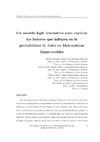Identificador persistente para citar o vincular este elemento:
https://accedacris.ulpgc.es/jspui/handle/10553/58171
| Campo DC | Valor | idioma |
|---|---|---|
| dc.contributor.author | Dávila Cárdenes, Nancy | en_US |
| dc.contributor.author | García Artiles,María Dolores | en_US |
| dc.contributor.author | Gómez Déniz, Emilio | en_US |
| dc.contributor.author | Pérez Sánchez, José María | en_US |
| dc.date.accessioned | 2019-11-28T10:40:27Z | - |
| dc.date.available | 2019-11-28T10:40:27Z | - |
| dc.date.issued | 2012 | en_US |
| dc.identifier.issn | 2171-892X | en_US |
| dc.identifier.other | Dialnet | - |
| dc.identifier.uri | https://accedacris.ulpgc.es/handle/10553/58171 | - |
| dc.description.abstract | En este trabajo se pretende explicar la probabilidad de éxito o fracaso en la asignatura Matemáticas Empresariales correspondiente al Grado en Administración y Dirección de mpresas en la Universidad de Las Palmas de Gran Canaria. Para ello se intentarán detectar los factores o covariables que influyen en dicha probabilidad utilizando, primero un modelo de regresión logística clásico y, en segundo lugar, un modelo de regresión logística asimétrico. En los modelos econométricos clásicos de regresión binaria tradicionalmente se emplea la regresión logística, que se basa en el enlace simétrico de uso de la distribución logística. El propósito de este trabajo, y a la luz de los resultados obtenidos en la muestra utilizada, es incorporar en el estudio un enlace de naturaleza asimétrica que trate de dar una mejor explicación de la variable que se desea estudiar. | en_US |
| dc.description.abstract | This paper aims to explain the probability of success or failure in the course Math-ematics for Business in the Degree in Business Administration in the University of Las Palmas de Gran Canaria. For this attempt, we try to identify factors or covariates in-fluencing this probability using first a Classical logistic regression model, and secondly, an logistic asymmetric regression model. In the classical econometric regression models traditionally binary logistic regression is used, which is based on the use of symmetrical distribution logistics. The purpose of this work, and considering the results in the sample used in the study, is to incorporate an asymmetric link to try to give a better explanation of the variable to be studied. | en_US |
| dc.language | spa | en_US |
| dc.relation.ispartof | Anales de ASEPUMA | en_US |
| dc.source | Anales de ASEPUMA [ISSN 2171-892X], n. 20, p. 15-0 | en_US |
| dc.subject | 5302 Econometría | en_US |
| dc.subject | 531204 Educación | en_US |
| dc.subject.other | Modelo logit | en_US |
| dc.subject.other | Estadística bayesiana | en_US |
| dc.subject.other | Matemáticas empresariales | en_US |
| dc.subject.other | Bayes | en_US |
| dc.subject.other | Evaluación | en_US |
| dc.subject.other | Modelo logit asimétrico | en_US |
| dc.subject.other | Logit Model | en_US |
| dc.subject.other | Asymmetric Logit Model | en_US |
| dc.subject.other | Assesment | en_US |
| dc.title | Un modelo logit alternativo para explicar los factores que influyen en la probabilidad de éxito en Matemáticas Empresariales | en_US |
| dc.type | info:eu-repo/semantics/article | en_US |
| dc.type | Article | en_US |
| dc.identifier.url | http://dialnet.unirioja.es/servlet/articulo?codigo=6014739 | - |
| dc.description.lastpage | 0 | - |
| dc.identifier.issue | 20 | - |
| dc.description.firstpage | 15 | - |
| dc.investigacion | Ciencias Sociales y Jurídicas | en_US |
| dc.type2 | Artículo | en_US |
| dc.description.notas | XX Jornadas de ASEPUMA y VIII Encuentro Internacional | en_US |
| dc.contributor.authordialnetid | 63806 | - |
| dc.contributor.authordialnetid | 535571 | - |
| dc.contributor.authordialnetid | 171022 | - |
| dc.contributor.authordialnetid | No ID | - |
| dc.identifier.dialnet | 6014739ARTREV | - |
| dc.utils.revision | Sí | en_US |
| dc.identifier.ulpgc | Sí | es |
| item.grantfulltext | open | - |
| item.fulltext | Con texto completo | - |
| crisitem.author.dept | GIR TIDES- Técnicas estadísticas bayesianas y de decisión en la economía y empresa | - |
| crisitem.author.dept | IU de Turismo y Desarrollo Económico Sostenible | - |
| crisitem.author.dept | Departamento de Métodos Cuantitativos en Economía y Gestión | - |
| crisitem.author.dept | GIR TIDES- Técnicas estadísticas bayesianas y de decisión en la economía y empresa | - |
| crisitem.author.dept | IU de Turismo y Desarrollo Económico Sostenible | - |
| crisitem.author.dept | Departamento de Métodos Cuantitativos en Economía y Gestión | - |
| crisitem.author.dept | GIR TIDES- Técnicas estadísticas bayesianas y de decisión en la economía y empresa | - |
| crisitem.author.dept | IU de Turismo y Desarrollo Económico Sostenible | - |
| crisitem.author.dept | Departamento de Análisis Económico Aplicado | - |
| crisitem.author.orcid | 0000-0002-8886-8140 | - |
| crisitem.author.orcid | 0000-0002-5072-7908 | - |
| crisitem.author.orcid | 0000-0002-7491-4345 | - |
| crisitem.author.parentorg | IU de Turismo y Desarrollo Económico Sostenible | - |
| crisitem.author.parentorg | IU de Turismo y Desarrollo Económico Sostenible | - |
| crisitem.author.parentorg | IU de Turismo y Desarrollo Económico Sostenible | - |
| crisitem.author.fullName | Dávila Cárdenes, María Nancy | - |
| crisitem.author.fullName | García Artiles,María Dolores | - |
| crisitem.author.fullName | Gómez Déniz, Emilio | - |
| crisitem.author.fullName | Pérez Sánchez, José María | - |
| Colección: | Artículos | |
Visitas
232
actualizado el 15-ene-2026
Descargas
259
actualizado el 15-ene-2026
Google ScholarTM
Verifica
Comparte
Exporta metadatos
Los elementos en ULPGC accedaCRIS están protegidos por derechos de autor con todos los derechos reservados, a menos que se indique lo contrario.
